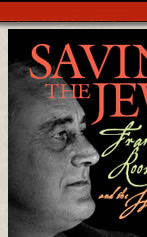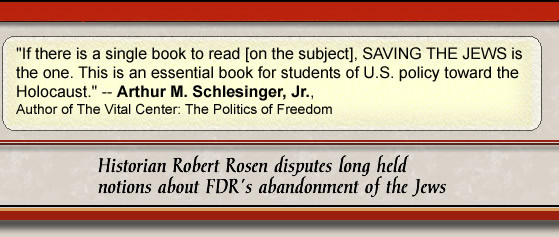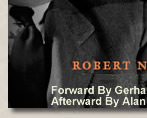




|
Reviews |
|
|
|
|
|
|
Why I Wrote The Book |
|
|
Excerpts |
|
|
Table Of Contents |
|
|
Auschwitz |
|
|
SS St. Louis |
|
|
Timeline |
|
|
A Survivor Speaks Out |
|
|
Carter Center Speech |
|
|
Justice At Nuremberg |
|
|
Purchase |
|
|
Related Links |
Robert Rosen
New Book Incites Scholarly Fracas
As a book that that seeks to upend commonly held historical notions, Robert N. Rosen’s “Saving the Jews” is by its very nature a combative work. But even by Rosen’s standards, his 17th chapter is a confrontational one. It is here that he engages FDR’s detractors most directly, in language that prompted 55 scholars to sign a petition condeming the book.
The chapter, titled “American Jewish Patriots, Palestinian Jewish Terrorists, and ‘the Irgunist Hoax,’” begins with a catalog of American Jewish contributions to the war effort: 550,000 Jewish American soldiers; 36,000 medal recipients; 35,157 casualties, and 8,000 killed in action. For Rosen, himself the son of a World War II veteran, such figures are central, a demonstration not only of American Jewry’s concern for Europe’s Jews but of FDR’s, as well.
Rosen contrasts those Jews who served in the U.S. armed forces with “a group of young Palestinian Jews stranded in the United States [who] sat out the war in America, preferring to agitate for the overthrow of the British in Palestine rather than enlist and fight Nazis themselves.” At the center of this group is Hillel Kook, aka Peter Bergson, an activist allied with the Irgun, the militant Zionist group active in Palestine in the years leading up to Israel’s creation.
In setting up his portrait of Bergson — several of whose followers did actually fight in the war — Rosen puts himself directly at odds with the work of Rafael Medoff, director of the David S. Wyman Institute for Holocaust Studies, and with Wyman himself, author of the book “The Abandonment of the Jews: America and the Holocaust, 1941-1945” (Pantheon, 1984), a much-lauded bestseller.
For Wyman and Medoff, co-authors of the book “A Race Against Death: Peter Bergson, America, and the Holocaust” (The New Press, 2002), Bergson is a hero, a central figure in alerting the world to Hitler’s bloody plan. For Rosen, Bergson is a charlatan who cynically employed the plight of Europe’s Jews in furthering his true goal: overthrowing British rule in Palestine. In the course of his Bergson discussion, Rosen takes direct aim at Medoff, Wyman and others. In one instance, he writes of “America-bashing Roosevelt decriers.” In another, he speaks of the “anti-FDR, pro-Irgun, anti-American version of history.”
The Wyman Institute petition is built around these two quotes. “In Robert N. Rosen’s new book,” the petition reads, “he impugns the patriotism of scholars… who have taken issue with the Roosevelt administration’s response to the Holocaust. Mr. Rosen accuses these scholars of promoting ‘an anti-American version of history’ and of engaging in ‘America bashing.’
Though carried out in scholarly guise, the feud between Rosen and the Wyman Institute, some following it say, is more akin to a schoolyard brawl than to a clear-eyed historical debate.
“On both sides there is a commitment,” said Peter Novick, emeritus professor of history at the University of Chicago and the author of “The Holocaust in American Life” (Houghton Mifflin, 1999), a chronicle of the uses and abuses of the Shoah in the postwar years. “The beating up on America and the administration is way overdone and ahistorical. On the other hand, there are those committed to polishing up the memory of FDR.”
There appears to be little interest on either side in reckoning with the opposition’s ideas. Many of those who signed the petition told the Forward that they did so without reading the book. Rosen, meanwhile, when asked what he made of the the Wyman Institute’s critique (a compendium of scores of alleged scholarly misdeeds), said that he had been too busy to get to it. Both Medoff, a prolific writer of op-eds and letters to the editor of newspapers and magazines, and Rosen, a divorce lawyer, clearly have a taste for confrontation. If anything, Rosen claims to enjoy the furor his book has unleashed. “I couldn’t get any publicity for my book until the Wyman Institute came around,” he said. “I relish this.”
But not all the parties involved are fans of the stark terms in which the feud has been waged. Laurel Leff, who is the author of last year’s “Buried by the Times: The Holocaust and America’s Most Important Newspaper” (Cambridge University Press) and also a signer of the petition, expressed displeasure with the way positions and ideas in the debate have been caricatured — including her own. “Rosen implies that I’m a supporter of the Bergson group, a sort of Irgunist, when I’m really no such thing,” she said. Leff, who regards herself as more sympathetic to Roosevelt than Medoff is, ultimately argued for balance. “You can say that American servicemen were heroes and still argue that American could have done more,” she said.
Offering what was perhaps the affair’s most measured note — and Rosen’s biggest endorsement — was Harvard Law School professor Alan Dershowitz, who also authored an afterword for the book. “The Holocaust is such an emotional issue, nobody can be neutral,” he told the Forward. “I didn’t necessarily come away agreeing with all of Rosen’s conclusions, but for me there was a lot of new information, a lot of new perspective. The question you pose when you read a book is, ‘Did I learn more today than knew before?’ and here the answer, very decidedly, is yes.”
The Jewish Daily Forward - Review By Gabriel Sanders -
Associate Editor - Sept 26, 2006
In his counterfactual vision of the United States during World War II, “The Plot Against America,” Philip Roth imagines a world in which Franklin Delano Roosevelt loses the 1940 presidential election to Charles Lindbergh, the famous aviator turned America Firster and Nazi sympathizer. President Lindbergh soon signs a nonaggression pact with Hitler, and pogroms and persecution ensue for the Jews of the Weequahic section of Newark, N.J. All throughout this nightmare scenario, Roosevelt is the savior waiting in the wings. It’s an FDR we hadn’t seen in a long time, a “bulwark against oppression,” as Roth describes him, “the first living American I was taught to love.”
How different this Roosevelt is from the one I grew up with.
I remember an FDR whose image was smeared with my grandfather’s spit. As a boy, I used to collect old Life magazines. It was a hobby I shared with my grandfather, a survivor of the Warsaw Ghetto and of Majdanek. He enjoyed staring at the pictures of the world before, the old toothpaste ads and mink stoles on the society pages. One day, I brought him a copy of the January 1, 1937, issue. It had a giant close-up of FDR on the cover, taken not long after he was elected to office a second time, his face so enlarged that you could see the crows’ feet at the corner of the president’s squinting eyes, the thin lips and the taut skin on that incredibly square jaw. My grandfather took one look at the magazine — protected, as I always kept them, in a plastic slipcover — and spat at Roosevelt’s nose.
His beef with FDR was neither ideological nor political. My grandfather was not an intellectual. It was an instinctive and deep resentment against the only man in the world who he felt had the power to prevent the murder of his family — and did nothing. It was also a feeling informed not by his own experience but rather by what had been established, firmly by the 1980s, as the new consensus on Roosevelt. By the time I was a boy, Roth’s redeemer of the Free World was thought of more as an enabler of oppression than as a bulwark against it.
Two recently published books endeavor to wipe this spit off FDR’s face. One, Robert L. Beir’s “Roosevelt and the Holocaust,” can be written off as a heartfelt but pedestrian attempt by an amateur historian to paint the president as a flawed but essentially virtuous father figure. The other book, Robert N. Rosen’s “Saving the Jews,” needs to be taken more seriously. And not because it has an afterword by no less then Alan Dershowitz or a blurb from Arthur M. Schlesinger Jr. But rather because its detractors are many, renowned and incredibly angry. In what amounts to using a six-gauge shotgun to shoot a cricket, a collection of 55 of the most respected names in Holocaust scholarship, in conjunction with the David S. Wyman Institute for Holocaust Studies, has issued a 33-page report that refutes Rosen’s book: “Whitewashing FDR’s Holocaust Record.” (See sidebar).
The original charges against FDR were first leveled in 1967 by CBS producer Arthur Morse’s slightly sensational “While Six Million Died: A Chronicle of American Apathy.” They crescendoed, however, with the 1984 publication of “The Abandonment of the Jews,” David Wyman’s authoritative, now canonical, account of what America didn’t do to save European Jewry. The new thinking generated by Wyman’s book has become such an inextricable part of the Holocaust narrative that both major memorial museums, at Yad Vashem and in Washington, refer specifically to the failures of the Free World, led by America, to stop the slaughter.
The indictment against Roosevelt is well known by now. It is usually divided into two parts. From 1933 to 1941, during the period of American neutrality, Roosevelt is accused of not doing enough to overcome the government’s strict immigration policy (the door having been shut tight since 1924) or the obstructionist xenophobes in the State Department to find a way to admit more Jews escaping a Hitler whose intentions were becoming increasingly clear. The 1938 saga of the St. Louis is always part of this story — the boat that was full of 1,000 Jews who had no choice but to head back to the doomed continent when no country, including Roosevelt’s, would take them in.
According to Wyman and others, after the war commenced it took Roosevelt too long to condemn what, by November 1942, was obviously mass murder. When he did, it then took him even longer to refer specifically to a Jewish tragedy. The president missed a few good opportunities to pay ransom in exchange for thousands of refugees, and, infamously, he never bombed Auschwitz. Wyman finds particularly unconscionable the 14 months that passed between knowledge of the “Final Solution” and the government’s only concrete action: the creation in January 1944 of the War Refugee Board, an agency whose efforts, largely subsidized by the American Jewish community, would save 200,000 Jews in the final year of the war. But even the WRB came about only after Roosevelt succumbed to political pressure, and fear of an election-year scandal, if he failed to make more than just another empty gesture. In short, as Wyman put it, “Franklin Roosevelt’s indifference to so momentous an historical event as the systematic annihilation of European Jewry emerges as the worst failure of his presidency.” Despite his best efforts, Rosen, a lawyer from South Carolina who, as the Wyman Institute report tells us, set out to write “an attorney’s brief in defense” of the president (which is essentially how the book reads), comes nowhere near anything as ambitious as a “whitewashing” of these facts. Even though the title of his book seems to be a self-conscious rebuttal to Wyman’s “Abandonment of the Jews,” there is no new evidence here whatsoever of Roosevelt “saving the Jews.” Instead, like a good lawyer, Rosen spins. He takes what information is already available, much of it actually from Wyman’s work, and reframes the story to arrive at the conclusion that FDR was a good man who sincerely cared about the fate of the European Jewry and did everything in his power to help them. “Were there things he could have done to save millions of European Jews that he failed to do?” Rosen asks himself. “Absolutely not.” How does he make his case? Two ways. First by performing a kind of glass-half-full maneuver. Why focus on the 6 million murdered Jews? Rosen asks. What about the fact that “Roosevelt’s attack on Nazism saved Palestinian Jewry, saved the future State of Israel, and saved twelve million Jews worldwide”? The doomed voyage of the St. Louis? Yes, a third of the passengers perished in the gas chambers, but how about the two thirds who were shepherded to safe countries and survived? And how dare we claim that the American Jewish community was cowardly and passive? What about the 550,000 Jewish Americans in uniform, some of whom died on the beaches of Normandy and of Iwo Jima?
His other tactic is to zero in on Roosevelt’s intent. Remember that Wyman indicts the president for his “indifference.” Rosen wants to prove that though FDR cared, he just wasn’t able to do more. With no new rescue efforts to reveal, this is the only exculpation he can offer. And he goes about his task with persistence. First he draws on every shred of evidence that Roosevelt liked Jews, including the convincing fact that they constituted 15% of his high-level appointments and, as a community, consistently gave him more than 90% of their vote. He milks every pronouncement against Nazi atrocities as proof of deep concern. And then, crucially, Rosen tells us, again and again, how many obstacles stood in FDR’s path despite this intent. In the background, there was always an American population too antisemitic too fight a war for the sake of saving Jews. There was Congress, unwilling to change its immigration laws. There was the State Department, conniving and hateful, hiding information and keeping out Jewish refugees. And more than all these together, there were the exigencies of the war itself, which took top priority in the man’s mind and from which he refused to be distracted. The Wyman Institute’s report claims that Rosen is able to make his case only because he grossly distorts his source material. But if that’s the business Rosen’s in, he doesn’t distort enough. Even with a vigorous and possibly unscrupulous defense lawyer, Roosevelt does not come off looking too good. He’s still too aloof. There’s no escaping the fact that he could have done something to alter immigration laws and to get rid of the obstructionist State Department personnel. There seems no possible excuse for Roosevelt needing such massive political pressure, to the point of being threatened with the leak of a document titled “Report to the Secretary on the Acquiescence of This Government in the Murder of the Jews,” before he could put in place America’s only authentic response. Still, this obnoxious terrier of a book manages to raise a few questions despite itself, questions that are hardly posed anymore. Do we too easily forget that the Holocaust took place during World War II, with all its limitations and distractions from rescue? What plans, beyond those of our fantasies, could have worked practically, with Germany in control of all of Europe until the summer of 1944? How many Jews could have been saved in the best of circumstances? And finally, to address Roosevelt’s central contention and self-justification, wasn’t bringing the war to as quick an end as possible, committing to it all available resources and energies, the best that one could do?
Rosen does not possess the thoughtfulness to answer these questions seriously. He wants to write a polemic. It’s unfortunate, because a chance to take one more look at FDR has been squandered. Jewish historian Henry Feingold once wrote that “historical research in the area of the Holocaust is beset with problems of no ordinary kind. It seems as if the memory of that human-made catastrophe were as deadly to the spirit of scholarship as was the actual experience to those who underwent the agony.” Roosevelt’s reputation has been one of the victims of this emotionally fraught scholarship. Maybe he deserves it. But is it too much to ask whether now, purged of the need to find ultimate villains in this story, it might be time to offer him a true re-evaluation?
Gal Beckerman - Sept 22, 2006